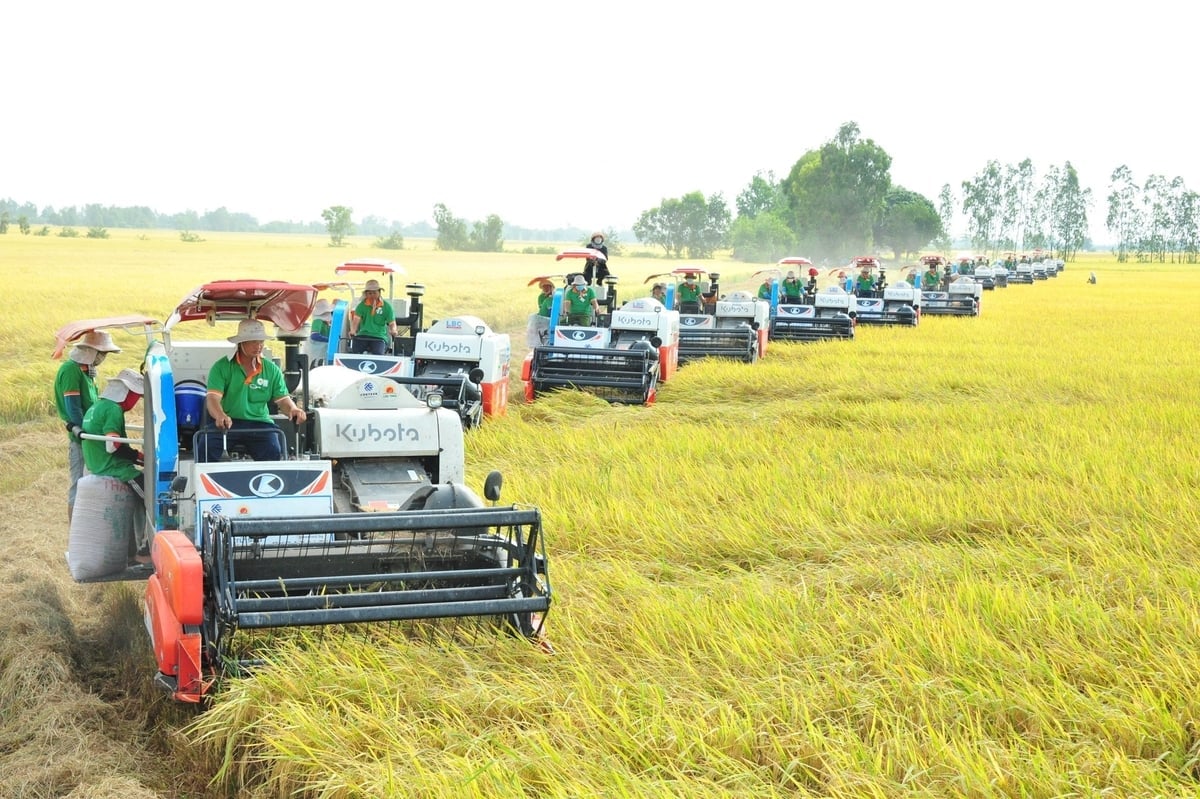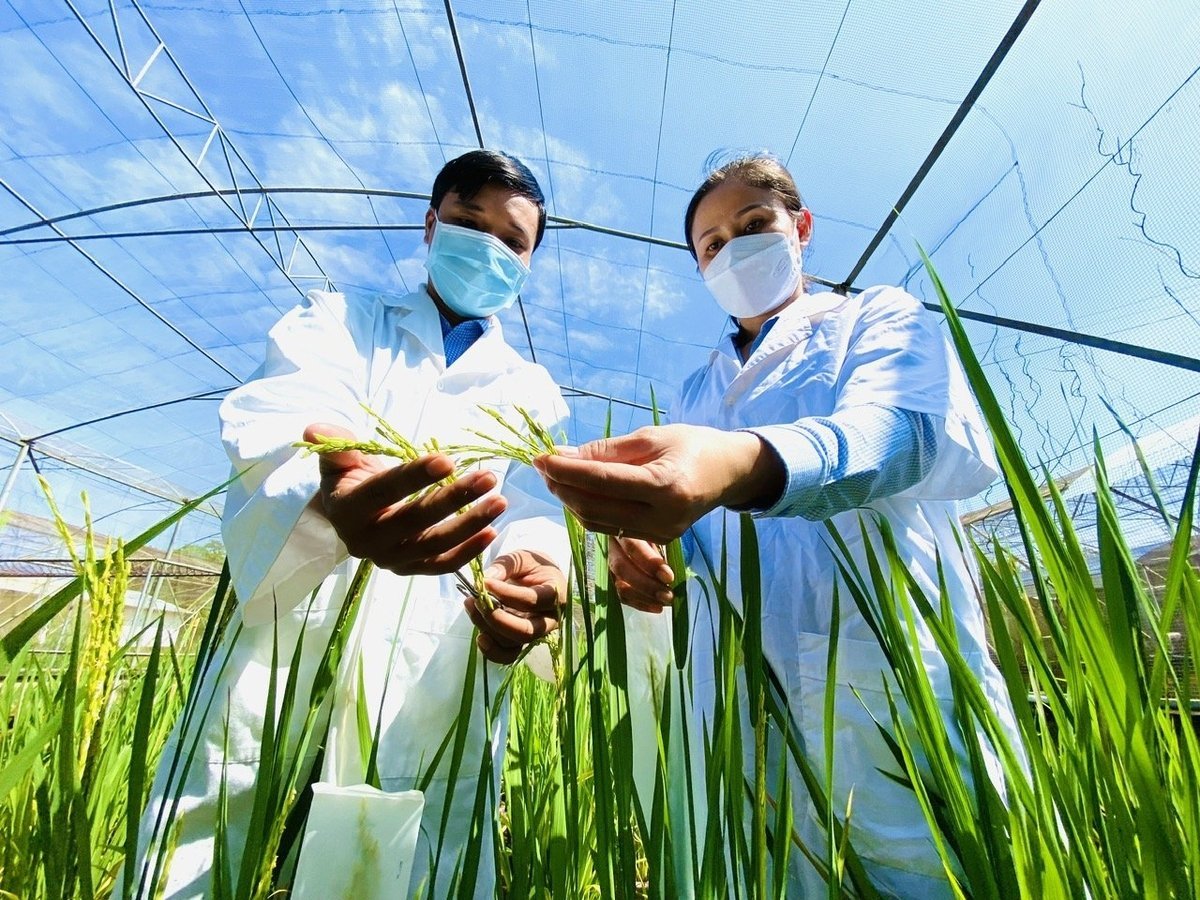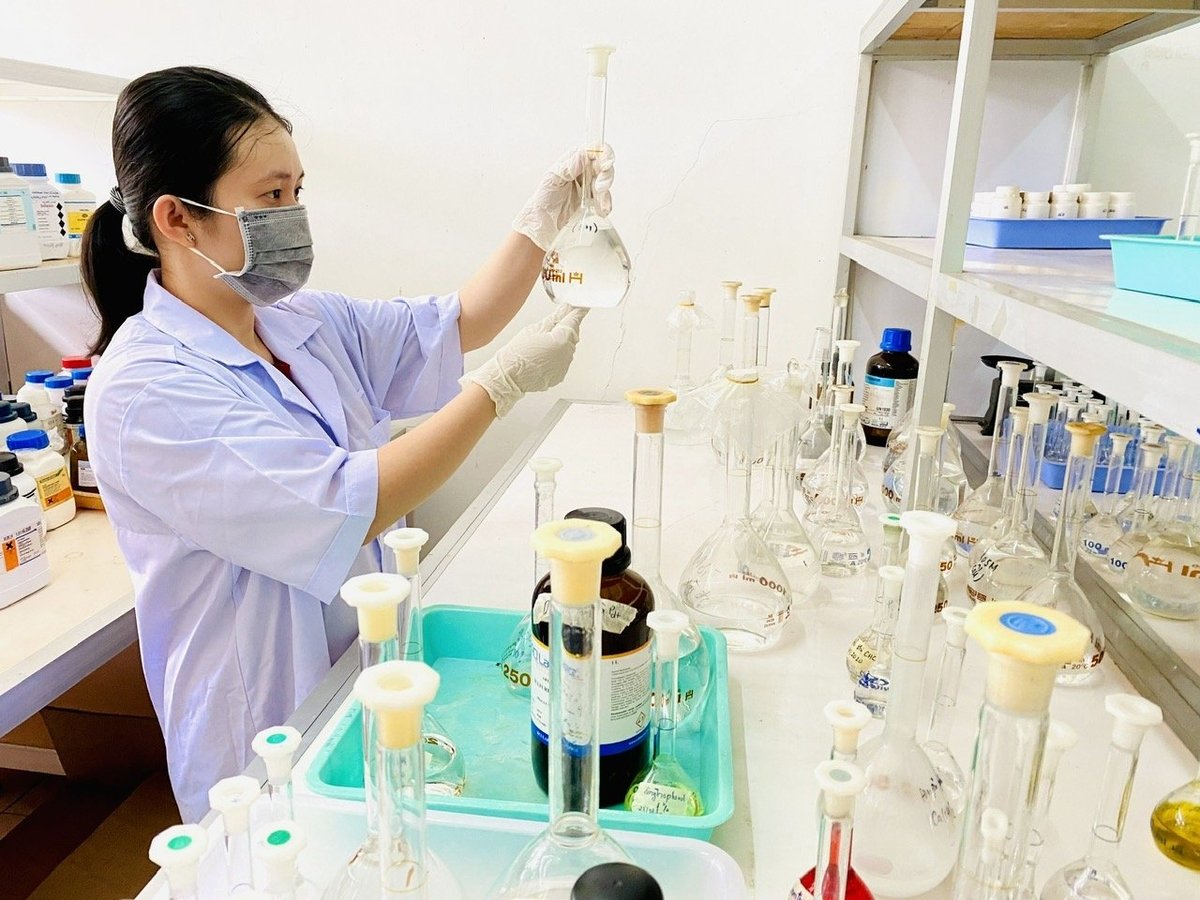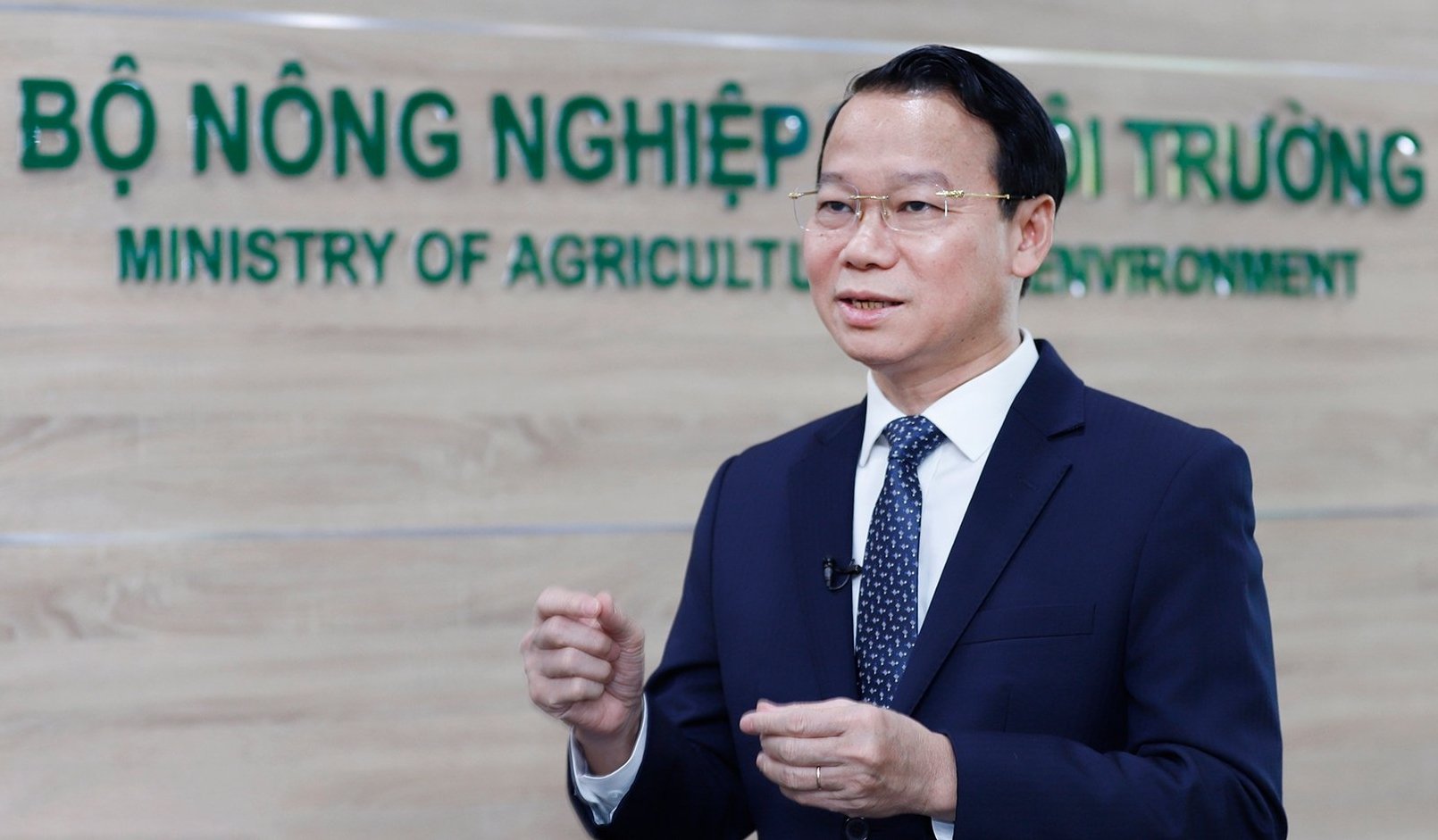June 10, 2025 | 23:53 GMT +7
June 10, 2025 | 23:53 GMT +7
Hotline: 0913.378.918
June 10, 2025 | 23:53 GMT +7
Hotline: 0913.378.918
Vietnam’s agriculture and environment sector has become a key pillar of the national economy. Previously unable to satisfy domestic demand, Vietnam has become a significant global agricultural exporter, with an export value exceeding USD 62 billion by 2024. This accomplishment is a testament to the substantial contributions of science, technology, innovation, digital transformation, and production strength.

Science and technology have made an especially important contribution to creating breakthroughs for the agricultural sector in recent years. Photo: Le Hoang Vu.
Science and technology are present in all sub-sectors of agriculture and the environment, such as cereal production, animal husbandry, fisheries, forestry, irrigation, disaster prevention, meteorology, climate change, natural resources, mapping, and remote sensing. Over 1.200 science and technology programs, projects, and initiatives were implemented between 2021 and 2025. Several of these have produced tangible results incorporated into production and governance, resulting in economic efficiency gains of approximately 30%. These outputs have been accepted and transferred by the appropriate authorities.
Scientific outputs have also served as the foundation for policy formulation and legislative development. They have informed national strategies, planning frameworks, and standard-setting, supported monitoring and management in land, water, and environmental resources, and underpinned the drafting of laws and implementation guidelines. Technological advancements have resulted in the development of new crop and livestock varieties, technical innovations, and practical processes with proven benefits.

Science and technology in the agricultural sector in recent years have contributed to increasing economic efficiency by about 30%. Photo: Le Hoang Vu.
In the past five years, approximately 1.000 demonstration models have been deployed throughout the country. These locally adapted, customized solutions have improved the quality, productivity, and market value of agricultural products, thereby facilitating the expansion of exports and the growth of domestic consumption. The models have also facilitated the modernization of rural living standards, environmental preservation, community development, and rural industrialization as part of the New Rural Development Programme.
Under the flagship program “Application of Technology in Building a Digital Government and Promoting Digital Transformation for 2021–2025,” the Ministry of Agriculture and Environment has initiated 35 research initiatives in digital transformation. These projects have yielded tangible outcomes, including the development of databases in critical domains such as land, geology, climate, and marine resources, the implementation of early warning systems for floods and landslides, the advancement of shared IT infrastructure, and the application of artificial intelligence in emissions monitoring and disaster prediction.
Among the most notable innovations are tools for land-use planning, earthquake alerts, hydrological image processing, online licensing systems, and digital platforms for disease warning, agricultural management, and public service delivery.
Crucially, digital transformation efforts have helped develop the legal framework for e-government in the sector, ensuring regulatory alignment for transitioning to a digital, modern, responsive agricultural and environmental governance system.

Despite many great achievements, the mechanisms and policies for science and technology activities in recent years have been problematic and have not created motivation for scientists. Photo: Le Hoang Vu.
Vietnam’s agriculture and environment sector continues to encounter numerous challenges, despite significant advancements in science, technology, innovation, and digital transformation.
One of the primary concerns is the fragmented and intricate regulatory framework for science and technology activities. The mechanisms for the coordination, technology transfer, and commercialization of research outcomes are unclear, and procedures continue to be burdensome. There are also no substantial incentives for enterprises to share intellectual property rights and participate in research. There is a lack of a clear legal pathway for confident business involvement, and policies that aim to attract social investment and private-sector engagement in scientific research have limited appeal.
At the same time, state-funded science and technology projects are governed by rigid regulations that exclude many potential participants. The level of public investment in research is inadequate to generate tangible results that are applicable in the real world. Vietnam’s public expenditures on science and technology are still modest, accounting for only 0.6% of GDP. The sectoral GDP allocation to agriculture and the environment is only approximately 0.21%.

Minister Do Duc Duy said he will focus on implementing five key, breakthrough solutions in science and technology in the agricultural and environmental sectors in the coming time. Photo: Khuong Trung.
Furthermore, human resource challenges continue to exist. Despite the substantial number of technical personnel, there is a shortage of top-tier experts, particularly in the fields of Industry 4.0 and emerging technologies. While public institutions continue to conduct the majority of research and innovation, the private sector continues to operate with limited involvement. Despite increasing awareness of the potential of selling research results, it has not yet become widespread among enterprises and cooperatives.
On 27 March 2025, the Ministry of Agriculture and Environment issued Decision No. 503 to resolve these barriers. This Decision outlines the Ministry’s plan to implement Resolution No. 57 of the Politburo, which aims to promote breakthroughs in science, technology, innovation, and digital transformation. The proposal also addresses Government Resolution No. 03 and National Assembly Resolution No. 193.
Minister Do Duc Duy has stated that the Ministry will implement seven critical task groups following the Decision, with a particular emphasis on five innovative solutions:
Initially, institutional obstacles should be eliminated, and administrative reform should be sped up to establish an environment that fosters innovation and research in both the public and private sectors.
Second, restructuring and streamlining the Ministry’s affiliated research bodies will increase their efficacy and impact. The annual research projects will be competitively tendered or commissioned, and they must address real-world demands in agriculture and the environment.
Third, resources should be allocated to flagship science and technology initiatives, particularly in high-impact fields like genetic engineering and biotechnology, to effect transformative change throughout the industry.
Fourth, establish and motivate a practical science and technology workforce. This encompasses policies that aim to attract and retain top-tier experts from domestic and international institutions, and mobilize private-sector talent, particularly from businesses and cooperatives.
Lastly, expedite the sector’s comprehensive digital transformation. Modernizing governance, which encompasses policy formulation, implementation, and monitoring, will promote sustainable and environmentally friendly agricultural growth.
Translated by Linh Linh

(VAN) Dr. Le Van Nguyen, Director of the Institute of E-Commerce Management (ECM), emphasizes the potential for green development through the cultivation of fruit trees, particularly in provinces such as Son La.

(VAN) VAAS and numerous Vietnamese enterprises have signed cooperation agreements with Japanese partners to promote agricultural technology and trade connectivity.
/2025/05/29/5625-12-214801_567.jpg)
(VAN) Provincial mergers in the Mekong Delta promise to streamline administration, expand inter-provincial raw material areas, and foster close linkages in agricultural value chains, benefiting both businesses and cooperatives.

(VAN) Merging Mekong Delta provinces contributes to the expansion of agricultural raw material areas, addressing previous constraints caused by provincial boundaries. Additionally, this expansion will reduce costs and strengthen linkages between businesses, cooperatives, and farmers.
/2025/05/29/1043-2-153730_145.jpg)
(VAN) The Government's policy to merge provincial-level administrative units opens up major opportunities for the Mekong Delta region to reshape its agricultural development strategy toward large-scale production, effective regional linkages, and sustainability.

(VAN) The mutual export of agrifood products between the European Union (EU) and the United Kingdom (UK) must occur again without certification, border controls or other red tape. This was agreed at the UK-EU summit.
/2025/05/22/5121-2-173645_677.jpg)
(VAN) NBSAP Tracker identifies strengths and areas for improvement in the National Biodiversity Strategy, based on each region’s priorities and capacities.